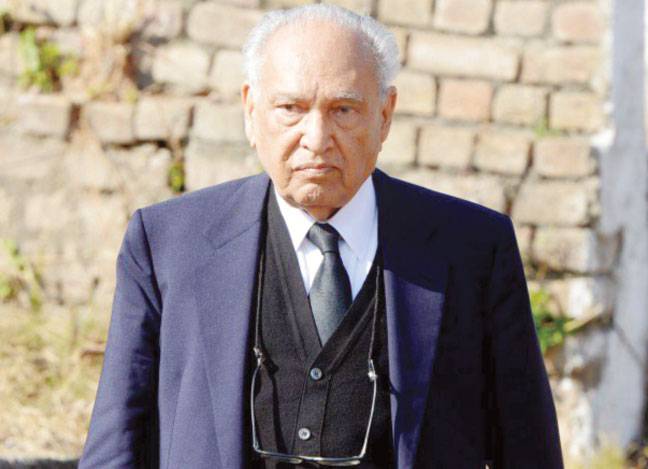KARACHI - Legal luminary Syed Sharifuddin Pirzada breathed his last here on Friday morning after a protracted illness at the age of 94.
Born on June 12, 1923, in Burhanpur, British India, in what is today Madhya Pradesh. His father was also a noted barrister who served the Indian Civil Service at that time and posted in the state.
Pirzada started his political career by working for Pakistan’s founding father Muhammad Ali Jinnah as his assistant in Bombay in 1941 and it was at Jinnah’s behest that he chose the legal profession before moving to the newly created Pakistan.
Syed Sharifuddin Pirzada, NI, Barrister-at-Law from Lincoln’s Inn and a graduate in Law from Bombay University, British India, in 1945, senior Supreme Court advocate, is widely regarded as Pakistan’s leading jurist and constitutional expert. He was also considered an authority on the Pakistan independence movement.
He was the longest serving attorney general of Pakistan. He remained the AGP from 1968-1971 and then during 1977-1985. He was very close to Gen Ziaul Haq and judges of superior courts were appointed on his recommendations. During the Ayub era, he served as foreign minister.
He was the brain behind the 1981 Provisional Constitutional Order which was promulgated when a PIA plane was hijacked to Syria by Murtaza Bhutto and others. The PCO was validated by two LHC judges, Rafiq Tarar and Gul Muhammad Khan.
He was also the author of the 8th Constitutional Amendment through which all important powers of the prime minister were transferred to the president. Muhammad Khan Junejo who was elected prime minister was reduced to a rubber stamp as a result of the 1985 party-less election.
The idea of a national security council was part of the 8th Amendment. However, it was dropped as a result of talks between the prime minister and the president who had worked out a timeframe to lift martial law. Pirzada appeared before superior courts in a number of cases of constitutional importance.
Not many people remember that Pirzada also served as secretary general of the Jeddah-based OIC during 1985-88. He was also a member of Committee of Eminent Jurists to review the OIC Charter 2007. For his best performance in the legal field he was awarded Nishan-i-Imtiaz in 1998. He would be remembered for long because of his services.
Our Staff Reporter from Islamabad adds: Sharifuddin Pirzada rose to fame in the case of Maulvi Tameezuddin when Ghulam Muhammad dissolved the first constituent assembly of Pakistan. He appeared as senior assistant to the counsel in that case. His last appearance was in a case against Mayor Waseem Akhtar before the Sindh High Court (SHC). He also remained adviser to General (retd) Pervez Musharraf.
Pirzada began his legal career in Bombay High Court before moving to the newly-created Pakistan. He had once been secretary to Muhammad Ali Jinnah.
Pirzada provided advice to the military rulers and framed the Provisional Constitution Order and the notifications of emergencies promulgated by the military dictators.
Pirzada himself wrote the order for Musharraf’s emergency rule, updating a similar one he prepared for Gen Ziaul Haq after his 1977 coup.
He also wrote oaths for judges sworn in by Gen Ziaul Haq and Musharraf that omitted the undertaking to protect the constitution and drew up documents based on the so-called “doctrine of necessity” to legalise military coups by both the dictators.
Pirzada was one of the members of Pervez Musharraf’s legal team in the high treason case. He had argued before a seven-judge bench of the Supreme Court in the review petition of Pervez Musharraf in the Sindh High Court Bar Association case.
During an interview in 2014, Pirzada spoke with professional pride about the Supreme Court judgment that had validated Zia’s rule. “That was a very nice judgment and had been appreciated elsewhere,” he said.
He received high civil awards from Jordan, Syria, France, South Korea and Germany.
He authored several books on Pakistan movement and aspects of constitutional law in Pakistan. His books included, “Pakistan at a Glance” published in 1941, “Jinnah on Pakistan” in 1943, “Leaders’ Correspondence with Jinnah”, “Evolution of Pakistan” in 1962 (also published in Urdu and Arabic languages), “Fundamental Rights and Constitutional Remedies in Pakistan” in 1966, “The Pakistan Resolution and Historic Lahore Session” in 1970, “Foundation of Pakistan” in 1971, “Some Aspects of Quaid-e-Azam’s Life” in 1978, “Collected Works of Quaid-e-Azam” and “Jinnah and the Dissolution of Constituent Assembly of Pakistan” in 1985.
Legal luminary Sharifuddin Pirzada
passes away






